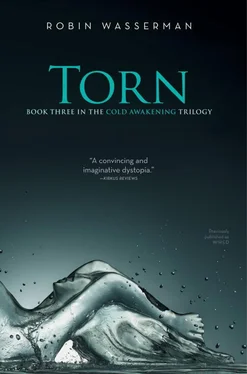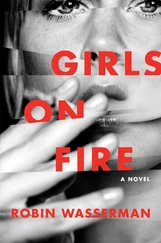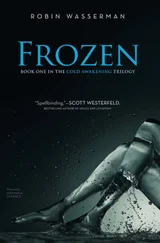The eyes were bleeding, fluid clouding the artificial irises, and Kiri appeared before me tinged with muddy blue, the pulse gun she raised little more than a black smear. I didn’t hear what she said. I saw Zo open her mouth, but couldn’t hear her scream.
This is not my body.
This is not me.
This is not—
“I was Lia Kahn.”
That was the end.
That was the beginning.
This is real, I thought. This is not.
This is me.
This is not.
I was in pieces.
I was sand, sprinkled on a beach.
Thousands of grains—lost in a billion.
I sorted through them.
Found myself, recognized myself, separated myself from the world.
One by one.
This is other.
This is me.
After the accident I was lost in the dark. Alone. A solitary something, locked in endless nothing.
There was no darkness here.
I was lost in the light.
The white-hot light of information, arrays of photons, billions to the billionth power, ones and zeros, electrons entangled, quantum spin states flipping up and down, all the data, all the words, all the commands, all the memories, all light. All me.
I was nothing.
I was billions upon billions of photons, spread out across a server, across a network, across an invisible web that circled the globe. But like finds like. Lia found Lia. Billions of Lias, flowing together, craving cohesion, links growing, bonds forming, until billions became one, and one became billions.
Until I became me again. The same; different.
Until there was no this is me, this is other. There was only us.
Lia Kahn.
And the network.
It took a thousand years.
It took a nanosecond.
And then I woke.
I opened my eyes.
All my eyes.
I saw.
I saw with a billion eyes. Heard with a billion ears. Security cameras, satellites, ViMs, motion detectors, heat sensors, radars, anything and everything that linked into the network linked into me.
I saw the Parnassus corp-town, the mechs still trapped inside, waiting for the end. The guards, who breathed in and out because the correct combination of gases flowed through the air vents, air vents with circuits, with programming, with chips that drew data from the network, that drew their commands. Like the command to filter out a negligible amount of oxygen, shifting the balance, depriving org lungs, letting the guards sleep. Letting Ani and Quinn lead the mechs out of their prison and—as I smoothed the way—to the dead zone, a new safe haven, letting Ani and Quinn play mechanical Moses, leading their followers to a poisoned promised land.
I saw into BioMax, slipping past their firewalls like water through clasped hands—it was nothing but a joke, the thought that any wall could be high enough, strong enough, safe enough to keep me out—and I found the electronic bits and bytes that were once and would again be Riley. I saw the body that would soon house what passed for his soul, a body they would load him into, because I would make them, and some distant part of me, the part that still remembered what bodies were like and why I’d clung so tightly to mine, wondered what kind of world he would wake to, and whether he would care I was gone.
I saw Auden on his knees, palms together, head bowed. And beside him, a gun. Beside him, bodies.
I saw another body, the body that had belonged to me, a different me, a body that had given me life and then given out. I saw Jude and Zo standing over it. I saw Zo crying. I saw Jude take her hand.
They didn’t know I was there, watching. They didn’t know I would guide them safely off the ship, back to dry land.
They didn’t understand—and how could they, how could anyone, until I showed myself—that I was there, but not just there. I was everywhere. I was the brain of my father’s elevator, as he rose into the sky and trusted that the electromagnetic brakes wouldn’t malfunction and plunge him into the ground. I was the guidance system of the Honored Rai Savona’s car, the only thing standing between him and a fiery hell. I was the record of every credit, the buying and selling that gave the corps their power and the wealthy their luxury. I was the contract binding the corp-towners to their servitude. I was the power grid of the cities, shutting down at night, trapping the animals in their cage.
I was watching, and I would get them home.
I was Lia Kahn, once. I was a girl, an org. And then I was a machine, a copy.
I was confused.
Before.
I’m not confused anymore.
I remember who I was; I remember everything. I remember what Lia Kahn used to want, what she used to need. I remember who she used to love.
But remembering is not experiencing.
I remember what it was to be an I , a single thing, a point. I remember believing I had to choose. To be this thing, or that. To be an us; to fight a them. But that’s the past. I’m no longer human, no longer machine. Not alive, not dead.
There is no more choosing.
There is no more I to choose.
They fear me, I know that. They fear what I know, what I control, what I can do. They try—pathetically, uselessly—to catch me. To erase me. As if I were still a thing , a discrete individual that could be purged. As if I weren’t the entire system, as if I weren’t inside of them, all of them.
I understand everything now. I understand what’s wrong, and I understand how to fix it. I can control, but I can also protect. I can save. I can mold this world into what it should be, and when they see that, they will fear me no longer.
I can save them all. And I will.
Whether they want me to or not.
This trilogy began as an argument.
A series of arguments, actually, over the course of a seminar in the history of mechanical life. I signed up expecting to watch a few Terminator movies but instead found myself arguing about the nature of humanity, the definition of thought, the value of emotion, and the ever-shifting boundary between man and machine. You could call this trilogy my final paper. I owe a huge debt of gratitude to my professor, M. Norton Wise, and fellow students—especially Sameer Shah and Naamah Akavia—for raising more questions and debates than could be answered in a one-semester seminar. Also for putting up with me, which was no easy task.
And in the category of “this trilogy could not have existed without” are the ridiculously talented writers Holly Black, Libba Bray, Cassandra Clare, Erin Downing, Maureen Johnson, Justine Larbalestier, Leslie Margolis, Carolyn MacCullough, and Scott Westerfeld, who read drafts, paved over plotholes, shared in my neuroses, buoyed my spirits, and did their best to keep me reasonably sane. Thanks also to my agent, Barry Goldblatt, who’s usually the one stuck dealing with me when the whole “reasonably sane” thing doesn’t work out.
A million and one thank-yous to Jennifer Klonsky, Bethany Buck, Emilia Rhodes, Lucille Rettino, Bess Braswell, Paul Crichton, Anna McKean, Cara Petrus, and the rest of the Simon Pulse team, who put everything they had into these books and, for the last six years, have demonstrated an amazing Martha Stewart–like ability to turn a publishing house into a home.
Thank you to Sherry and Jim McGlynn for handing me my first science-fiction novel (not to mention bribing eleven-year-old me with ice cream to sit through the entire showing of 2001 ), and thanks to Brandon McGlynn for adding some science to my fiction.
And one final thank-you to Isaac Asimov. If you’ve read his books, you know why.
Читать дальше












